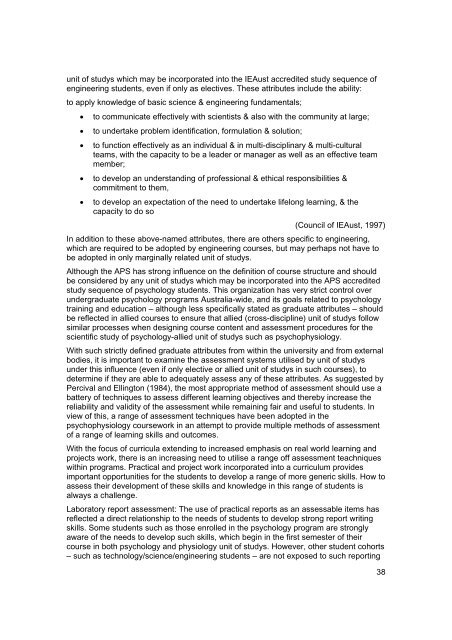Staff Information & Teaching Guide - Swinburne University of ...
Staff Information & Teaching Guide - Swinburne University of ...
Staff Information & Teaching Guide - Swinburne University of ...
You also want an ePaper? Increase the reach of your titles
YUMPU automatically turns print PDFs into web optimized ePapers that Google loves.
unit <strong>of</strong> studys which may be incorporated into the IEAust accredited study sequence <strong>of</strong><br />
engineering students, even if only as electives. These attributes include the ability:<br />
to apply knowledge <strong>of</strong> basic science & engineering fundamentals;<br />
to communicate effectively with scientists & also with the community at large;<br />
to undertake problem identification, formulation & solution;<br />
<br />
<br />
to function effectively as an individual & in multi-disciplinary & multi-cultural<br />
teams, with the capacity to be a leader or manager as well as an effective team<br />
member;<br />
to develop an understanding <strong>of</strong> pr<strong>of</strong>essional & ethical responsibilities &<br />
commitment to them,<br />
to develop an expectation <strong>of</strong> the need to undertake lifelong learning, & the<br />
capacity to do so<br />
(Council <strong>of</strong> IEAust, 1997)<br />
In addition to these above-named attributes, there are others specific to engineering,<br />
which are required to be adopted by engineering courses, but may perhaps not have to<br />
be adopted in only marginally related unit <strong>of</strong> studys.<br />
Although the APS has strong influence on the definition <strong>of</strong> course structure and should<br />
be considered by any unit <strong>of</strong> studys which may be incorporated into the APS accredited<br />
study sequence <strong>of</strong> psychology students. This organization has very strict control over<br />
undergraduate psychology programs Australia-wide, and its goals related to psychology<br />
training and education – although less specifically stated as graduate attributes – should<br />
be reflected in allied courses to ensure that allied (cross-discipline) unit <strong>of</strong> studys follow<br />
similar processes when designing course content and assessment procedures for the<br />
scientific study <strong>of</strong> psychology-allied unit <strong>of</strong> studys such as psychophysiology.<br />
With such strictly defined graduate attributes from within the university and from external<br />
bodies, it is important to examine the assessment systems utilised by unit <strong>of</strong> studys<br />
under this influence (even if only elective or allied unit <strong>of</strong> studys in such courses), to<br />
determine if they are able to adequately assess any <strong>of</strong> these attributes. As suggested by<br />
Percival and Ellington (1984), the most appropriate method <strong>of</strong> assessment should use a<br />
battery <strong>of</strong> techniques to assess different learning objectives and thereby increase the<br />
reliability and validity <strong>of</strong> the assessment while remaining fair and useful to students. In<br />
view <strong>of</strong> this, a range <strong>of</strong> assessment techniques have been adopted in the<br />
psychophysiology coursework in an attempt to provide multiple methods <strong>of</strong> assessment<br />
<strong>of</strong> a range <strong>of</strong> learning skills and outcomes.<br />
With the focus <strong>of</strong> curricula extending to increased emphasis on real world learning and<br />
projects work, there is an increasing need to utilise a range <strong>of</strong>f assessment teachniques<br />
within programs. Practical and project work incorporated into a curriculum provides<br />
important opportunities for the students to develop a range <strong>of</strong> more generic skills. How to<br />
assess their development <strong>of</strong> these skills and knowledge in this range <strong>of</strong> students is<br />
always a challenge.<br />
Laboratory report assessment: The use <strong>of</strong> practical reports as an assessable items has<br />
reflected a direct relationship to the needs <strong>of</strong> students to develop strong report writing<br />
skills. Some students such as those enrolled in the psychology program are strongly<br />
aware <strong>of</strong> the needs to develop such skills, which begin in the first semester <strong>of</strong> their<br />
course in both psychology and physiology unit <strong>of</strong> studys. However, other student cohorts<br />
– such as technology/science/engineering students – are not exposed to such reporting<br />
38

















